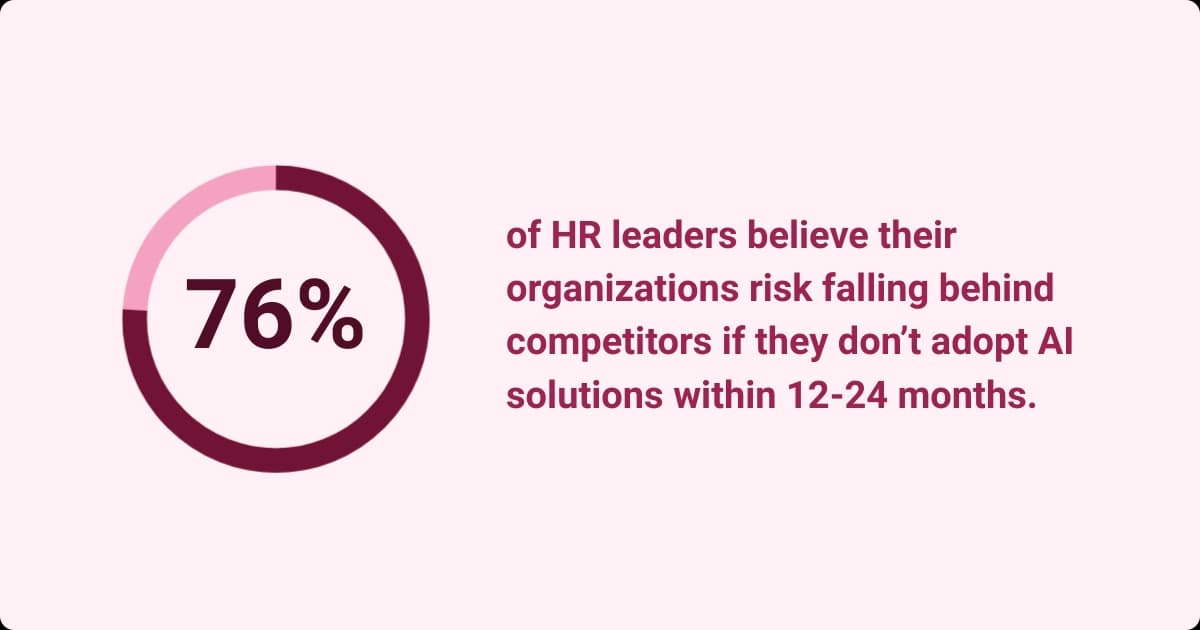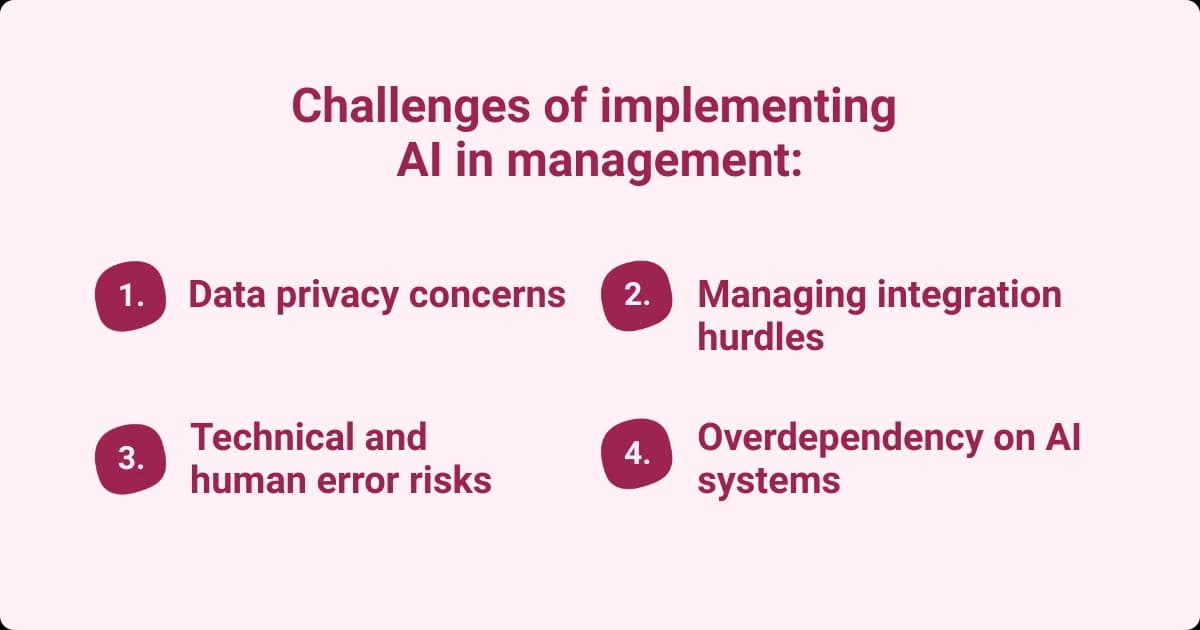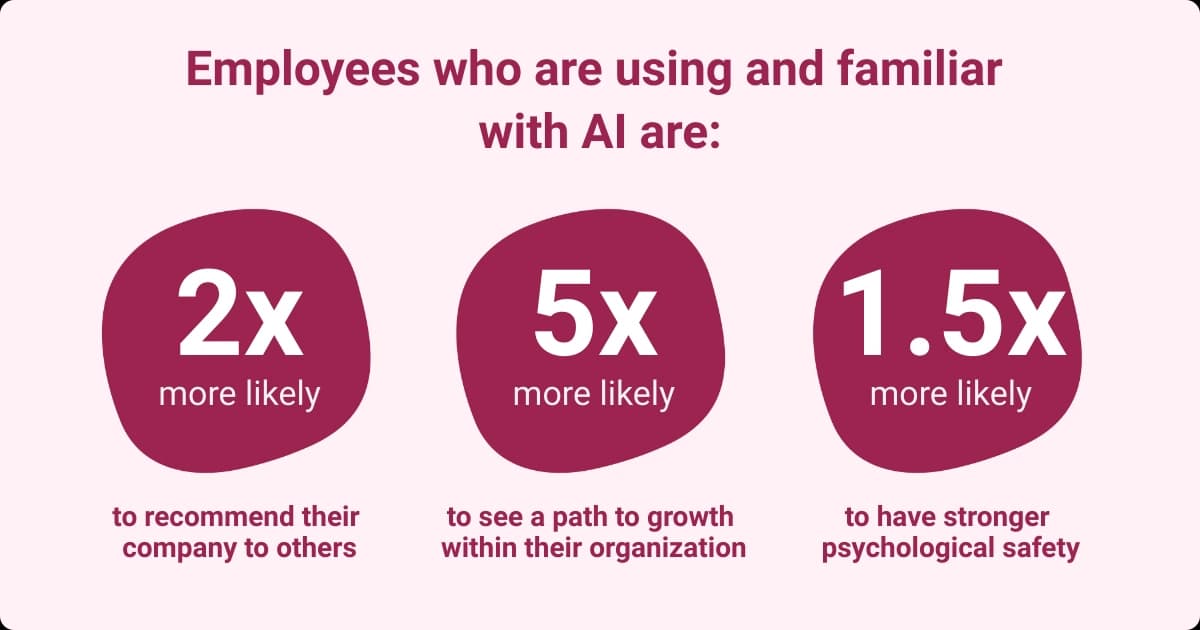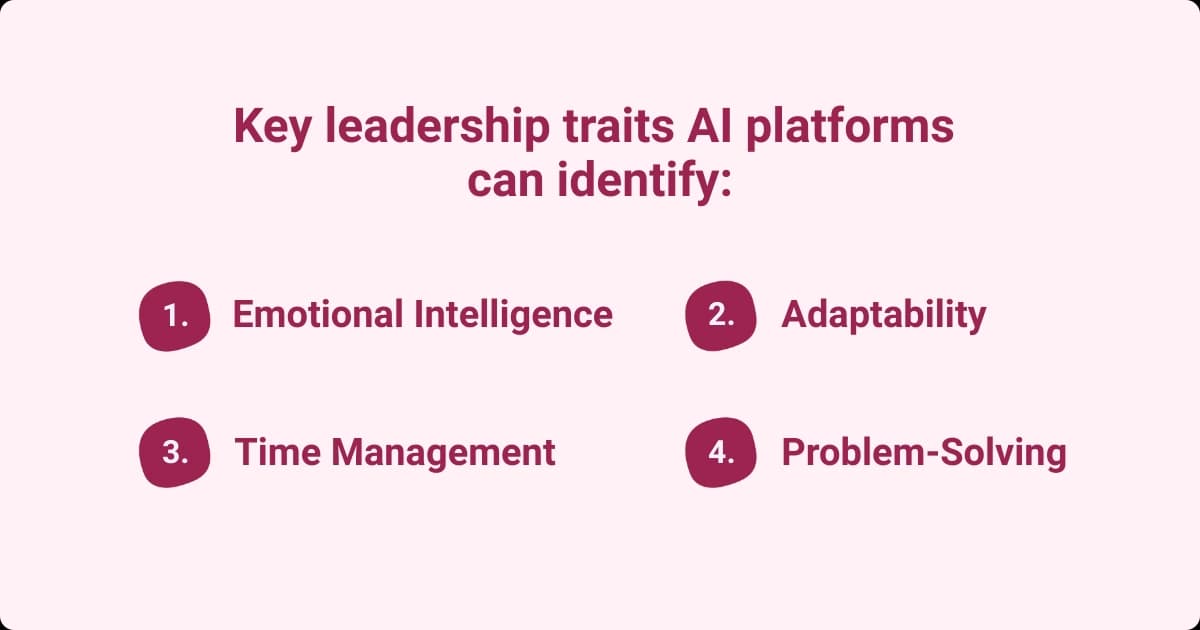The Role of AI in Management: Transforming the Future of Business

Artificial intelligence (AI) is at the forefront of practically every industry now, and it's sticking around. As with any aspect of your business, you should strive to lead by example when adopting AI in management, which means understanding how the technology works and what its most significant challenges are.
AI business management tools can streamline much of your workflow, from monitoring employee performances to recruiting top talent. It also provides crucial insights to help you make decisions, prepare for future risks, and improve employee satisfaction.
Discover the role of AI in management, including its most significant impacts and challenges, to prepare your organization for the future.
What is the role of AI in management practices?
Artificial intelligence (AI) is revolutionizing management by enabling managers to make smarter, data-driven decisions. By leveraging AI technologies, leaders can streamline operations, analyze vast amounts of data, and optimize long-term strategies.
From financial management to project delegation and risk mitigation, AI provides solutions that transform how managers and leaders approach their roles. AI’s ability to analyze historical data and identify patterns is reshaping business management in profound ways.
AI’s role in long-term business planning
AI algorithms are powerful tools for analyzing historical sales data, market trends, customer behavior, and other essential metrics. This data enables managers to predict future developments, such as shifts in demand or changes in industry trends, with remarkable accuracy.
By using machine learning algorithms, businesses can make informed decisions about product stocking and recruitment and even anticipate potential sales declines.
With AI systems, the time required to analyze and interpret vast amounts of data is dramatically reduced. Although no prediction is perfect, AI can create dynamic strategies based on the most significant market trends, providing managers the flexibility to prepare for various scenarios.
AI in risk management and mitigation
AI management tools run predictive analytics and scenario analyses to forecast potential risks and opportunities, especially during particular business challenges. For example, supply chains use AI systems to prepare for pandemics, inflation, natural disasters, and other scenarios with an approximately 90% accuracy rate.
AI's machine learning (ML) and deep learning (DL) compare previous scenarios with the current market trends to estimate inventory, budget, and staffing needs. Beyond identifying risks, AI also provides solutions for minimizing impacts, such as stocking inventory several months in advance.
Enhancing human resource management
Generative AI and natural language processing streamline key processes, such as recruitment, development, and employee engagement.
Here are some ways AI enhances HR management:
- Recruitment and onboarding: AI can analyze candidate resumes and work histories to identify top talent aligned with your organization’s needs. Automating tasks like background checks and payroll setup speeds up the onboarding process.
- Employee engagement: Programs such as Workhuman® track employees' most critical metrics, including their engagement and potential motivators. This makes it easier to recognize stellar performances and harness your workplace's existing culture.
- Diversity and inclusion: AI can highlight gaps in workplace diversity and suggest strategies to build a more inclusive culture.
- Predictive analytics: AI assesses market shifts and evolving HR requirements to identify future needs.
- Training and reskilling: AI can also highlight potential skills gaps and recommend solutions, including training programs and online seminars.
Leveraging AI in HR ensures managers and leaders can focus on strategic growth while streamlining day-to-day operations.

AI in project management
Tracking various employees' tasks when completing projects can leave you with a lot to delegate. The role of AI in project management allows you to monitor progress without checking in on each employee..
These tools can also automate your project timeline, assess potential risks, allocate potential resources, and keep you notified about project updates for the best possible execution.
AI in performance management
AI tools assess employees' performance using various metrics, including their absenteeism, error frequency, produced revenue, and time spent on each task. This does a lot more than identify "good" or "bad" workers. Advanced AI tools detect potential areas for growth and provide actionable insights, such as by pointing out technical obstacles.
Once you know where your team is at, AI will help you set clear and measurable performance goals for your entire organization. AI can also automate your feedback systems for continuous improvement, which is crucial for communication and transparency in leadership.
Automating routine tasks with AI
AI business tools automate data entry, file storage, scheduling, and other administrative tasks. Removing these mundane and repetitive responsibilities can save you and the rest of your team time, letting you maximize your work hoursOpens in a new tab and focus on higher-level initiatives. Popular AI tools for automating repetitive tasks include Zoho Forms, HubSpot, TestCraft, and Adobe Firefly.
Predictive analytics and AI for management
AI-driven analytics can assess significantly more data than any human, helping you weigh as many variables into your business strategy as possible. AI analytics tools such as Tableau and Workhuman collect data about market trends, revenue, employee engagement, and more.
When combined, this information lets you predict and prepare for risks, maintenance needs, downtime, changes in supply chain availability, and other setbacks. You can also use it to spotlight your organization's greatest strengths, such as by offering additional training to your top-performing employees.
AI’s influence on real-time decision making
In today's fast-moving markets, you must be able to make agile and accurate decisions. AI solutions such as Pecan and Quantilope provide real-time insights and recommendations, helping you respond to dynamic business environments. This lets your organization capitalize on fast market trends and quickly adapt to new practices and technology.
The challenges of implementing AI in management

Artificial intelligence (AI) plays a crucial role in modernizing business management, but its adoption is not without challenges. From ethical dilemmas to technical setbacks, many managers must navigate these obstacles to fully harness AI’s potential. By preparing for these challenges, organizations can integrate AI tools effectively while reducing risk.
Key challenges of integrating AI into management include:
- Privacy concerns: Balancing employee and corporate privacy when adopting AI.
- Implementation hurdles: Managing the learning curve for managers to use AI tools effectively.
- Error risks: Addressing technical and human errors in AI-driven systems.
- Overdependency: Avoiding overreliance on AI systems for critical decision-making.
Addressing AI ethics and privacy concerns
When adopting artificial intelligence in business management, privacy concerns are unavoidable. Managers can use AI applications to process sensitive employee data—such as Social Security numbers, background checks, and addresses—but the improper use of these tools can lead to significant risks.
Mishandling such information not only violates privacy laws but could also harm employee trust.AI can help managers streamline tasks like performance reviews, but relying solely on AI-generated data introduces ethical concerns.
For instance, using only AI algorithms to evaluate employees might cause managers to overlook intangible contributions, such as leadership qualities or teamwork. Empowering managers to consider both AI data and human input ensures a fair and comprehensive approach. To mitigate privacy risks and ethical concerns:
- Use secure AI systems and reliable software.
- Train managers to balance AI insights with judgment when making decisions.
- Regularly review AI solutions to ensure alignment with organizational values.
Ensuring smooth AI integration with existing systems
While AI enables businesses to analyze historical data and uncover insights for better decision-making, integrating AI with existing business processes may pose technical challenges. AI algorithms can help organizations process large amounts of data, but they are only as reliable as the inputs they receive. Minor issues, like a misformatted dataset, could compromise results without alerting managers.
To ensure effective AI integration:
- Allocate time for training teams on AI applications.
- Conduct frequent tests to verify data accuracy and AI outputs.
- Offer ongoing education for employees, helping them maximize AI's potential.
AI integration is not just about implementing tools—it’s about developing a culture where AI assists managers without creating bottlenecks or confusion.
Managing dependency on AI systems
AI can automate many tasks, from inventory management to customer relationship management. While these capabilities reduce workloads, overreliance on AI in management systems can lead to missed opportunities or errors.
For example, AI algorithms can help managers analyze historical data to create risk mitigation strategies. However, they may fail to account for non-quantifiable factors like team morale or sudden market shifts.
Empower managers to use AI insights as a foundation but emphasize the importance of human oversight to detect anomalies or missed nuances.
To maintain balance:
- Use AI as a tool, not the sole decision-maker.
- Ensure critical tasks like employee feedback or portfolio management involve human review.
- Regularly audit AI outputs to avoid blind spots in business strategies.
What is the future of AI in management?
The future of AI in management is challenging to predict, given how rapidly the technology is developing. Since generative AI's boomOpens in a new tab, AI has reshaped nearly every work process, including:
- Leadership responsibilities
- File management
- Cybersecurity
- Overall business capabilities
In doing so, AI has also introduced several new risks and challenges, such as privacy concerns and technical errors. AI-generated content can also impair your brand's authenticity, and only evaluating progress using AI analytics can cause you to overlook real-world setbacks.
How AI will transform the workplace
Artificial intelligence has already revolutionized many industries, including finance and healthcare, and will continue to do so for the foreseeable future. For example, AI has simplified the challenges of managing remote employees, allowing for more efficient communication and operations in digital workspaces.
These AI tools will continue evolving with new communication, file-sharing, and data-collection practices as industries teeter between remote, hybrid, and in-person work models.

The role of AI in leadership development AI and decision-making in the future workplace
Machine and deep learning algorithmsOpens in a new tab are designed to develop and grow over time, improving how they analyze large-scale data and adapt to your unique organization. This will help AI tools develop more accurate recommendations, such as identifying the best job candidates, and increase the variables that leaders can consider. AI will be more active in most industries' decision-making moving forward.
Still, even with years of machine learning, it's becoming apparent that some of AI's limitations are unavoidable. Per the rule of "garbage in, garbage out," even the best AI will only be as good as its user.
As your organization adopts more technology, you should continue to watch for weaknesses and limitations in your AI's analytics. Additionally, monitor your team's work to prevent human errors from impacting the AI's results.
The role of AI in leadership development
Similar to how it assists with staff recruitment, using AI in leadership development can help you identify skills gaps and key leadership traits for yourself and your team. Offering leadership training to your top performers establishes future leaders for your organization, which is especially vital if you plan to expand.
AI-based platforms can highlight the best hard and soft skills for your organization's leadership, including:
- Emotional intelligence
- Adaptability
- Time management
- Problem-solving

Will AI replace managers?
Management is a very human-centric job, as you work with and oversee other people. There are many parts of management that artificial intelligence cannot do, from recognizing social cues to having tough conversations about employees' futures. So, it's safe to believe that artificial intelligence will never be able to fully replace human managers.
However, AI can handle many aspects of managers' jobs, such as administrative tasks and monitoring employees' performances. Therefore, while organizations will always need management, some may not need nearly as much management as they did before.
Businesses will have different ways of responding to these changes. Some organizations are already utilizing their leadership's newfound downtime to embark on new, higher-level initiatives. This includes investing in employee recognition initiatives that raise morale and improve manager effectiveness.
However, some companies may consider down-scaling or removing lower-level management positions for the sake of cost savings.
Wrapping up
Using AI and machine learning can enable managers to streamline basic tasks, make quick decisions, and prepare for agile team meetings that prioritize ai and human collaboration. Of course, an essential part of this process is knowing how to actually use your AI analytics and data to benefit your organization, including your employees' experiences.
For better or worse, AI is here to stay. This means most businesses can no longer opt out of the technology if they want to keep up with their competition. Adopting AI in business management sooner rather than later can help you stay ahead in your industry.
Workhuman tracks your teams' most crucial analytics to identify opportunities for growth and recognition. Get started today to make the most of AI's business management capabilities.